
For an easy main dish the whole family will love, try making this fantastic braised lamb shanks recipe. With its succulent, fall-off-the-bone texture and rich, thick red wine gravy, slow-cooked braised lamb shanks are a delicious dish that is simple and inexpensive to make.
All you need to do is sear the shanks then braise them in the oven for a few hours in a heavenly mixture of tomato, broth, and vegetables. It's a simple, hearty, yet incredibly flavorful dish that's perfect for any occasion. Serve your lamb shanks with mashed potatoes or cauliflower mash, or some roasted veggies – and don't forget the bread to mop up the red wine gravy!
What is a Lamb Shank?
Lamb shanks come from the shin of the lamb. It's an inexpensive, tougher cut of lamb, which makes it perfect for slow cooking. When slow cooked, lamb shanks become wonderful tender and juicy, so don't pass them up!

Braised Lamb Shanks Ingredients
In addition to lamb shanks, you'll also need carrots and onions to bulk out the sauce.
For the base of the sauce, beef broth, tomato sauce, tomato paste, and red wine are essential.
Rosemary, salt, and pepper add extra flavor to the dish, while butter gives it a mouthwatering richness.
How to Make Braised Lamb Shanks
To make these phenomenal braised lamb shanks at home, start by preheating your oven to 350F. Heat a little oil in your Dutch oven, then sear the lamb for 4 minutes on each side. Place the lamb on a plate and set it aside while you cook the veggies and make the sauce.
Melt half of the butter and sauté carrots and onions until softened. Stir in the garlic and cook until it becomes fragrant, then stir in the tomato paste. Pour the broth and tomato sauce into the pot, then place the lamb back in. Make sure the lamb is submerged in the liquid. This will keep it tender and infuse the meat with flavor. Allow the mixture to come to a boil then lid the Dutch oven and pop it in the oven.
Bake the shanks for 2 hours, or until the lamb is tender. After 2 hours, take the lamb out and put it on a cutting board. Loosely tent it with foil, so it stays warm. Allowing it rest will help keep the meat tender. Place the Dutch oven on the stove over medium flame.
Pour in the wine and bring the mixture to a boil. Lower the heat to a simmer and cook it until the gravy thickens. Melt in the remaining butter. Stir, then serve the lamb over mashed potatoes and top with gravy.

How to Know When Lamb Shanks are Done
When the lamb has finished cooking, it should be fall-off-the-bone tender. You can also use an instant-read meat thermometer to know when it's done. Lamb should read 145°F when it's fully cooked.
The best way to avoid overcooking it is to remove the meat from the pot after 2 hours and let it rest while you thicken the gravy.
How to Thicken Gravy for Braised Lamb
The best way to thicken your braised lamb shank gravy is to remove the lamb shanks from the pot and simmer the gravy on the stovetop until it thickens.
You can also add a 1:1 ratio of cornstarch and water (about a tablespoon of each should do) to thicken the gravy up more quickly if simmering isn't working for you.

Can You Make Braised Lamb Shanks in a Slow Cooker?
You don't need to use your oven to make beautiful, tender braised lamb shanks; you can use a slow cooker instead. Follow the instructions for cooking the lamb and vegetables, cooking them in your slow cooker instead of a Dutch oven. Cook the lamb on low for 6 to 8 hours or on high for 4 to 5 hours.
Can You Make Braised Lamb Shanks in an Instant Pot?
Don't feel like waiting hours for your lamb shanks to be done? No worries you can use your Instant Pot. Cook the lamb shanks for 10 to 15 minutes on high, followed by a natural release. Thicken the gravy by switching your Instant Pot to Saute, and simmering it until it cooks down.
What to Serve With Braised Lamb Shanks
Serve your braised lamb shanks with creamy homemade mashed potatoes or roasted potatoes, steamed veggies, or a green salad.
For a keto option, you can serve them with cauliflower mash.
How to Store Braised Lamb Shanks
Keep your lamb shanks in an airtight container and store them in the fridge for up to 3 days.
Ingredients
Instructions
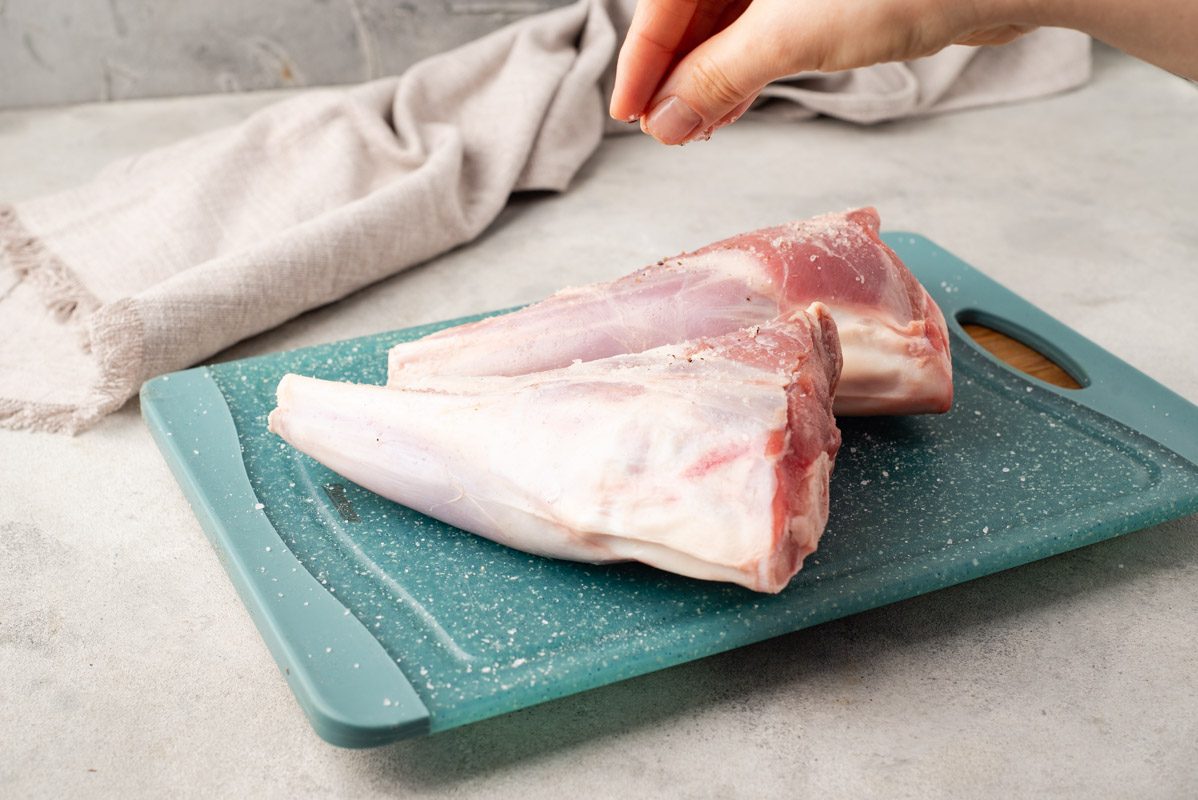;Resize,width=712;)
Preheat your oven to 350F. Generously season the lamb with salt and pepper.
Preheat your oven to 350F. Generously season the lamb with salt and pepper.
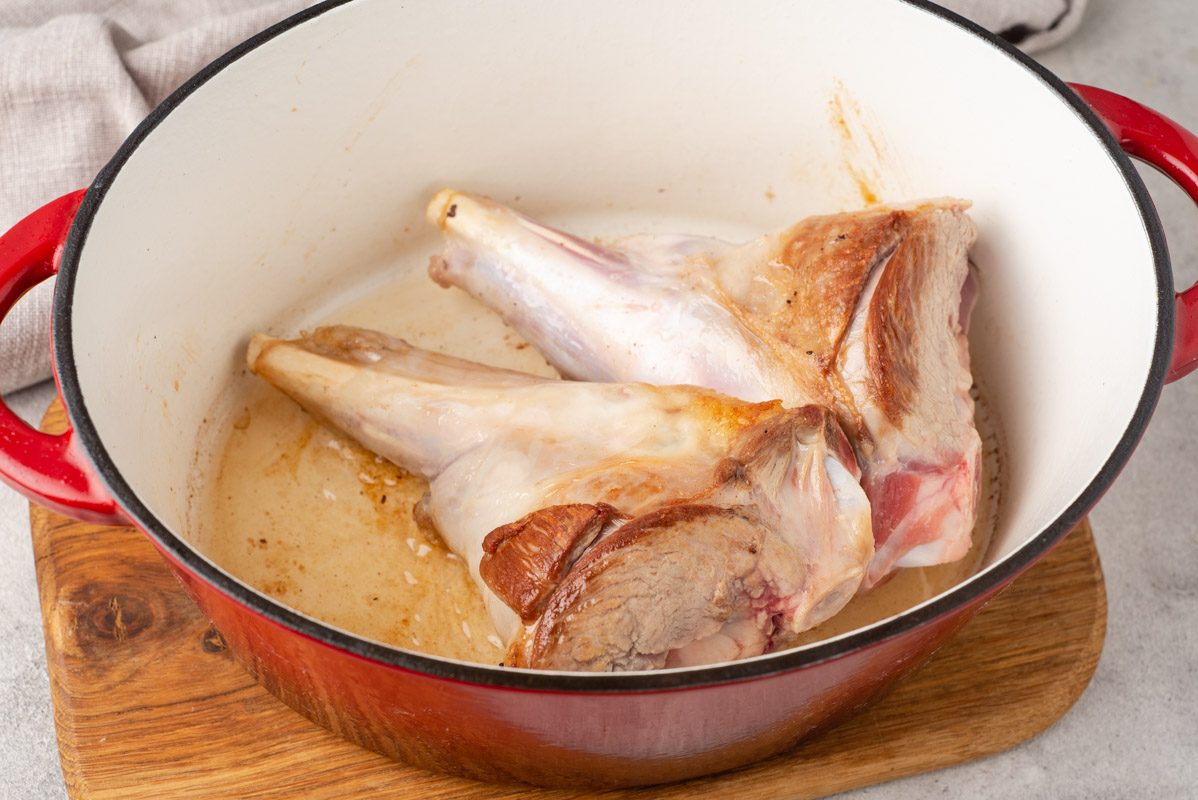;Resize,width=712;)
Heat oil in a Dutch oven. Cook the lamb for 4 minutes on each side, until golden brown. Place the lamb on a plate and set aside.
Heat oil in a Dutch oven. Cook the lamb for 4 minutes on each side, until golden brown. Place the lamb on a plate and set aside.
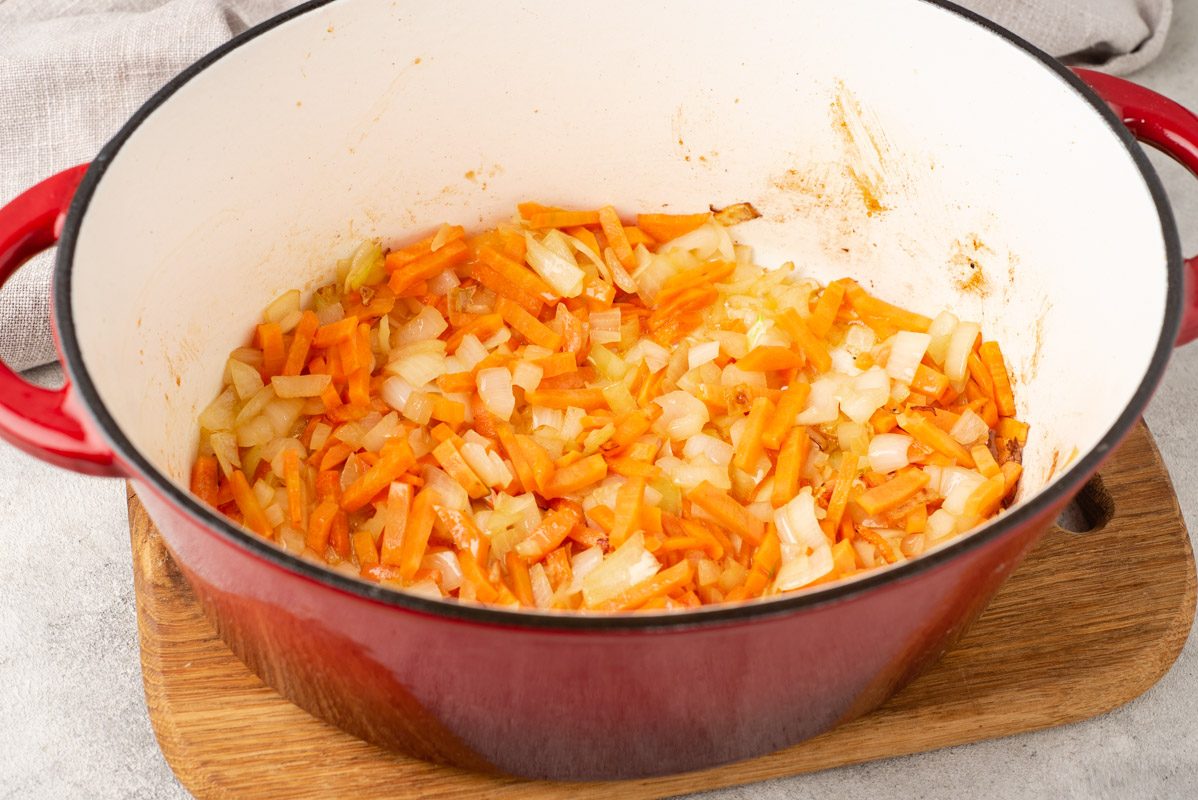;Resize,width=712;)
Melt 2 tablespoons of butter in the Dutch oven. Sauté carrots and onions for 4 minutes, until softened. Stir in the garlic and cook until fragrant, about 45 seconds to 1 minute.
Melt 2 tablespoons of butter in the Dutch oven. Sauté carrots and onions for 4 minutes, until softened. Stir in the garlic and cook until fragrant, about 45 seconds to 1 minute.
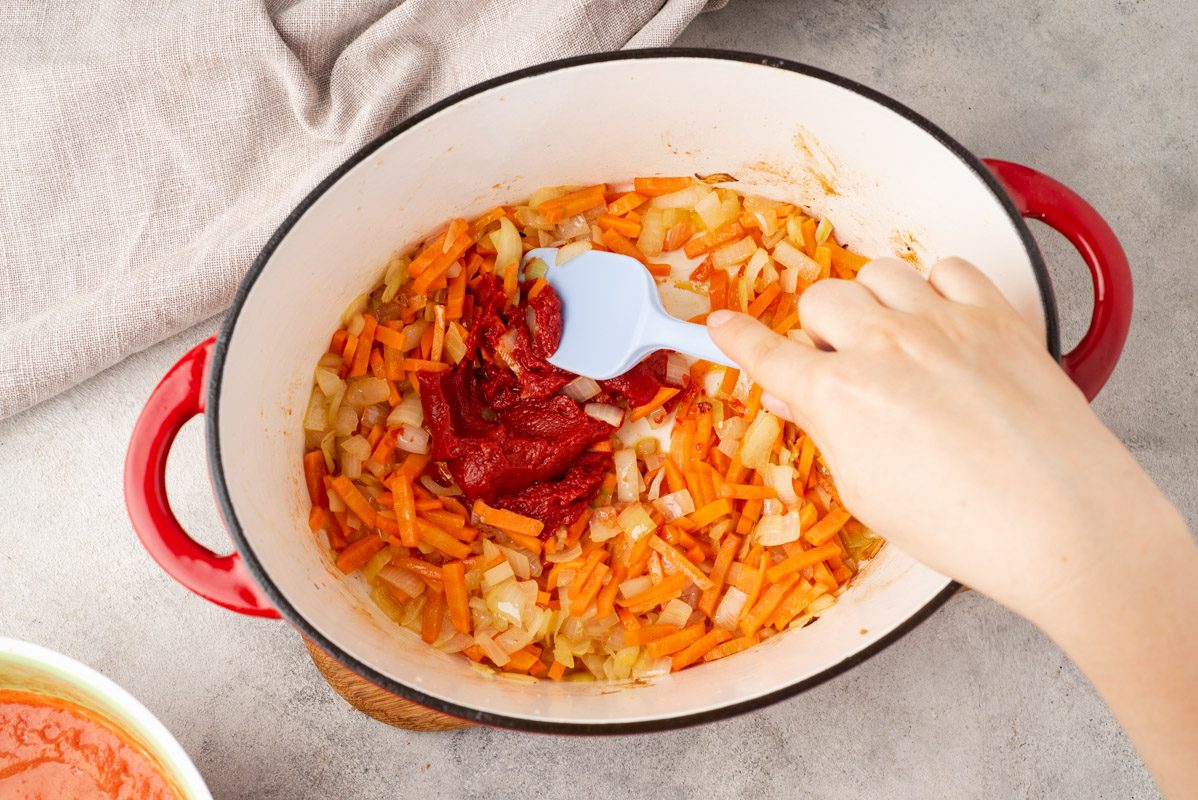;Resize,width=712;)
Stir in the tomato paste, making sure to coat the onions and carrots.
Stir in the tomato paste, making sure to coat the onions and carrots.
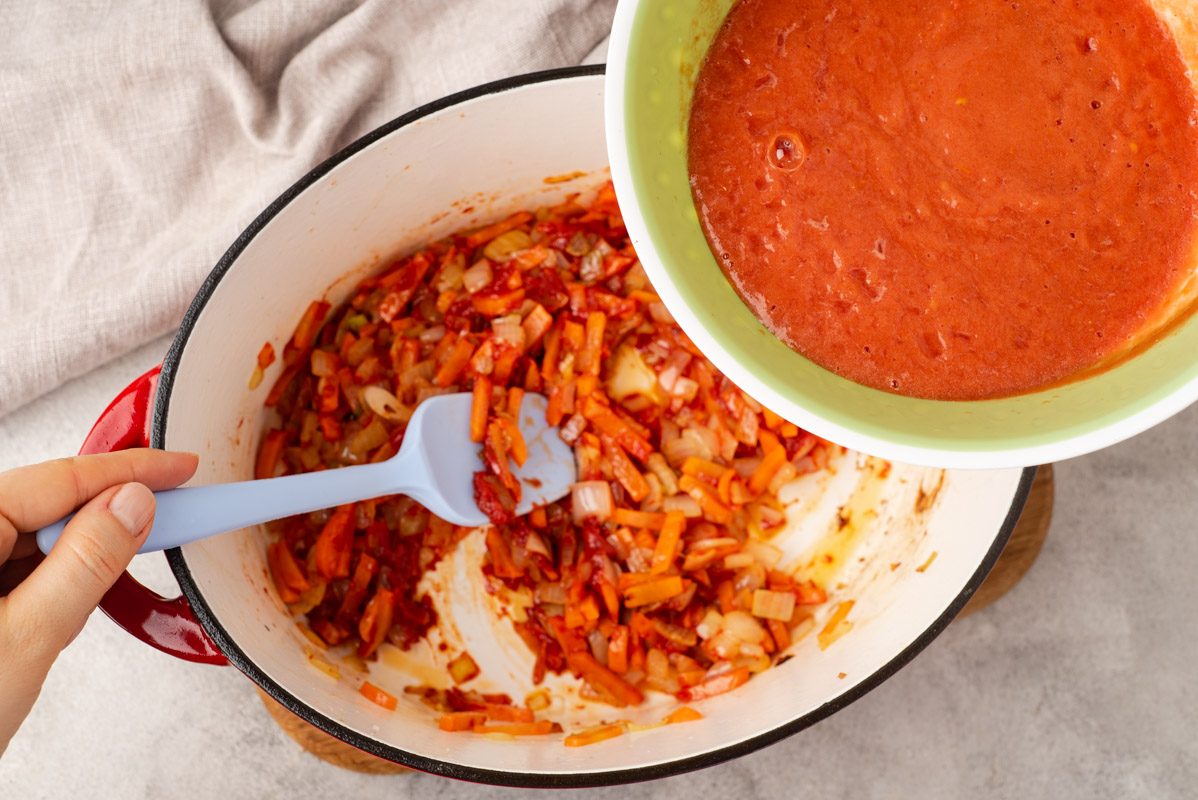;Resize,width=712;)
Stir in the tomato sauce.
Stir in the tomato sauce.
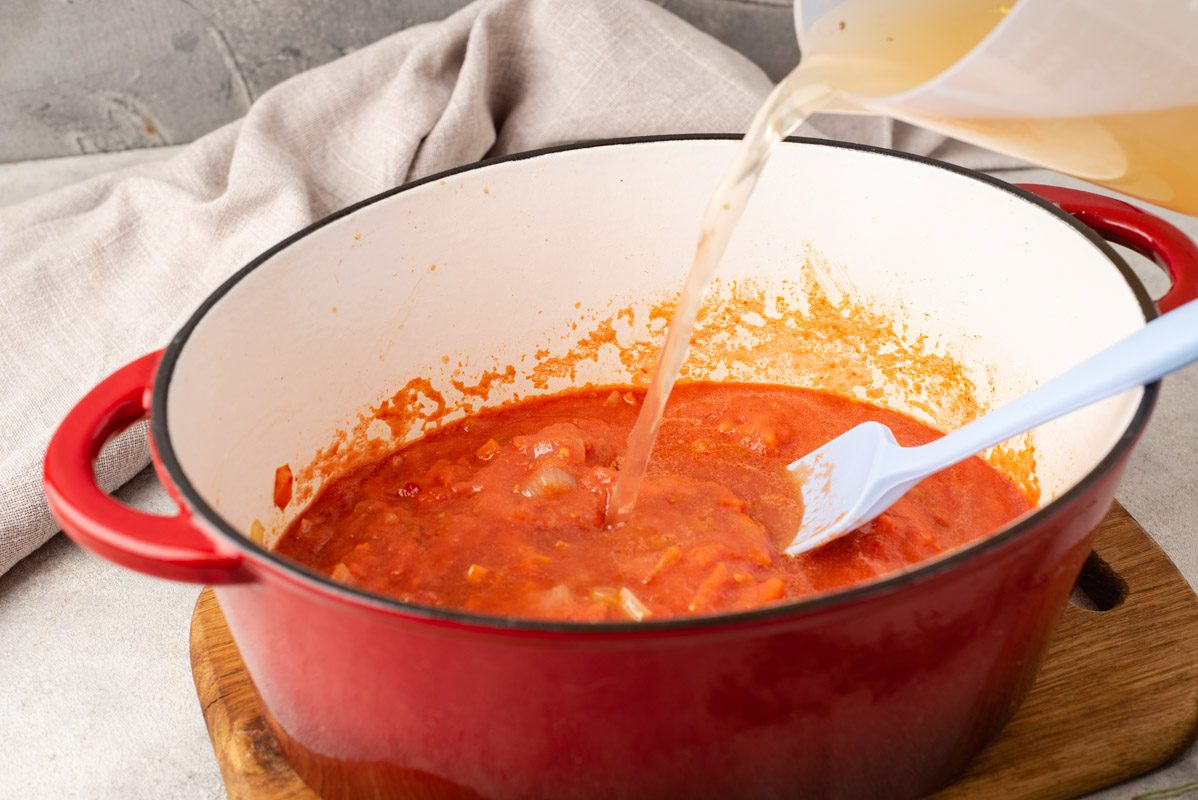;Resize,width=712;)
Pour in the broth.
Pour in the broth.
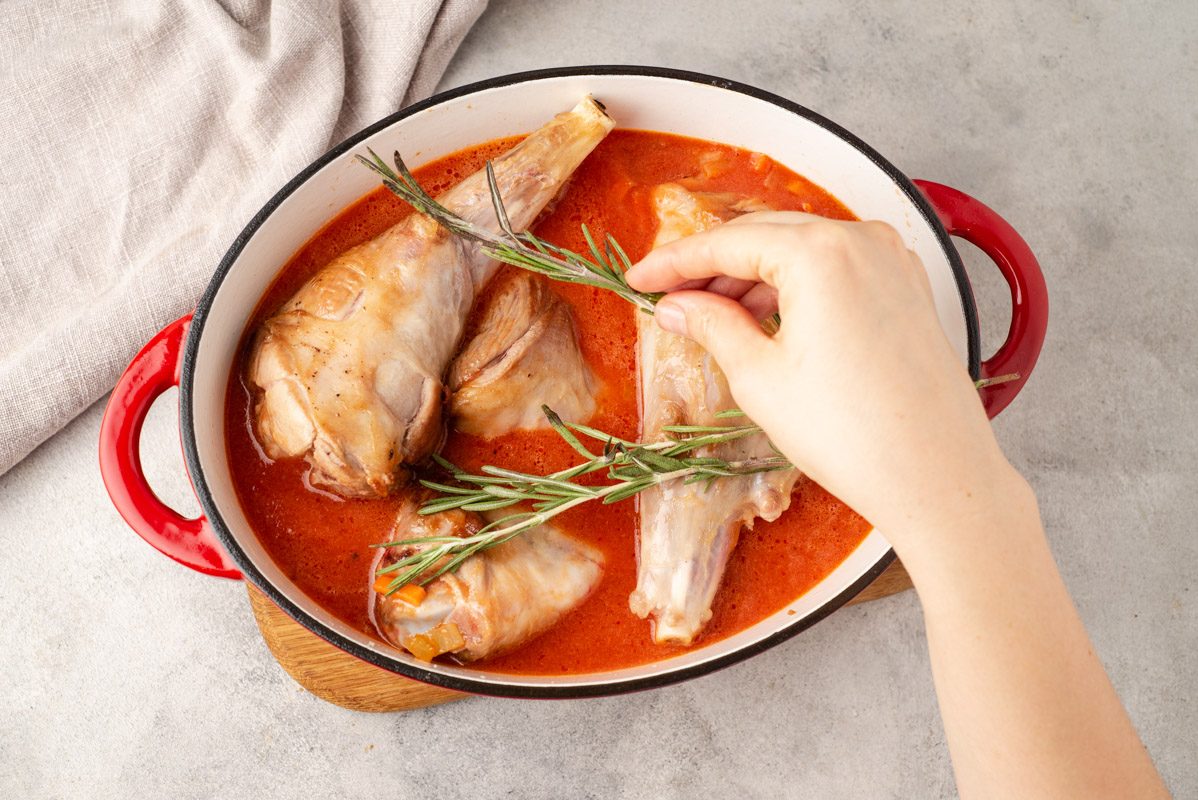;Resize,width=712;)
Place the lamb back in the pot along with the rosemary.
Place the lamb back in the pot along with the rosemary.
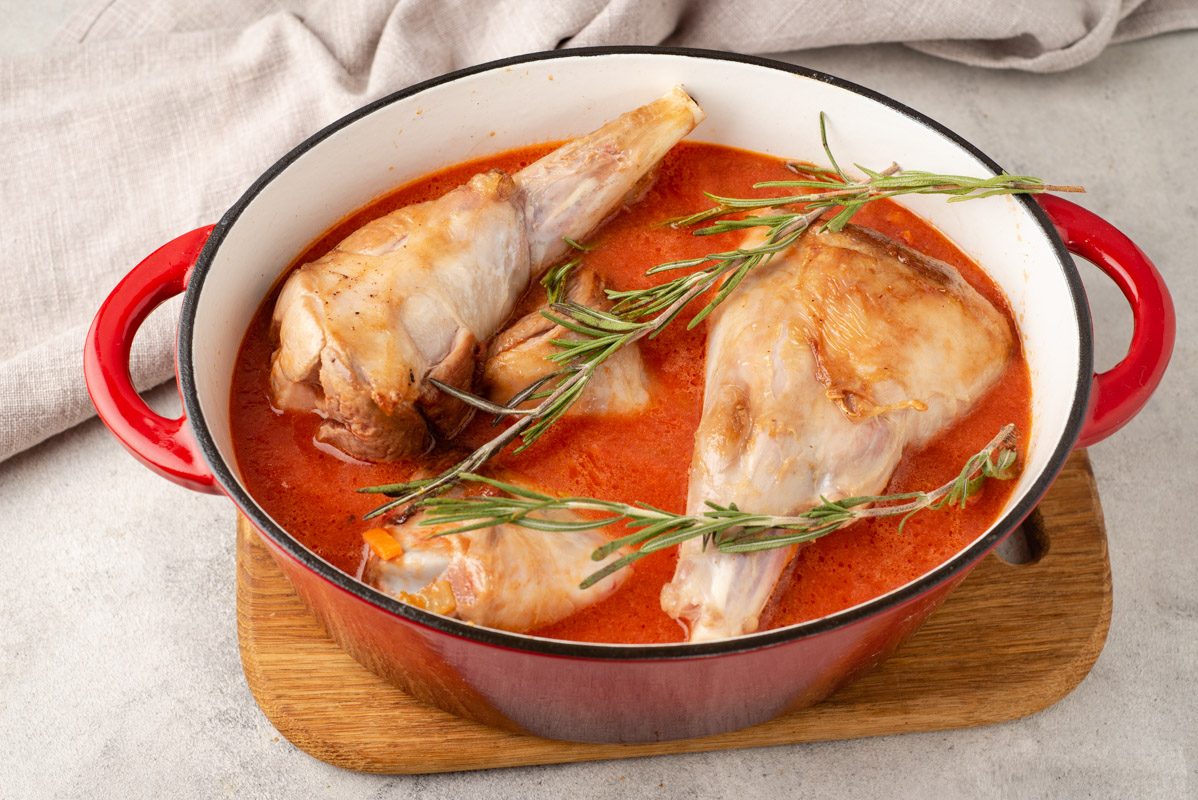;Resize,width=712;)
Bring the mixture to a boil.
Bring the mixture to a boil.
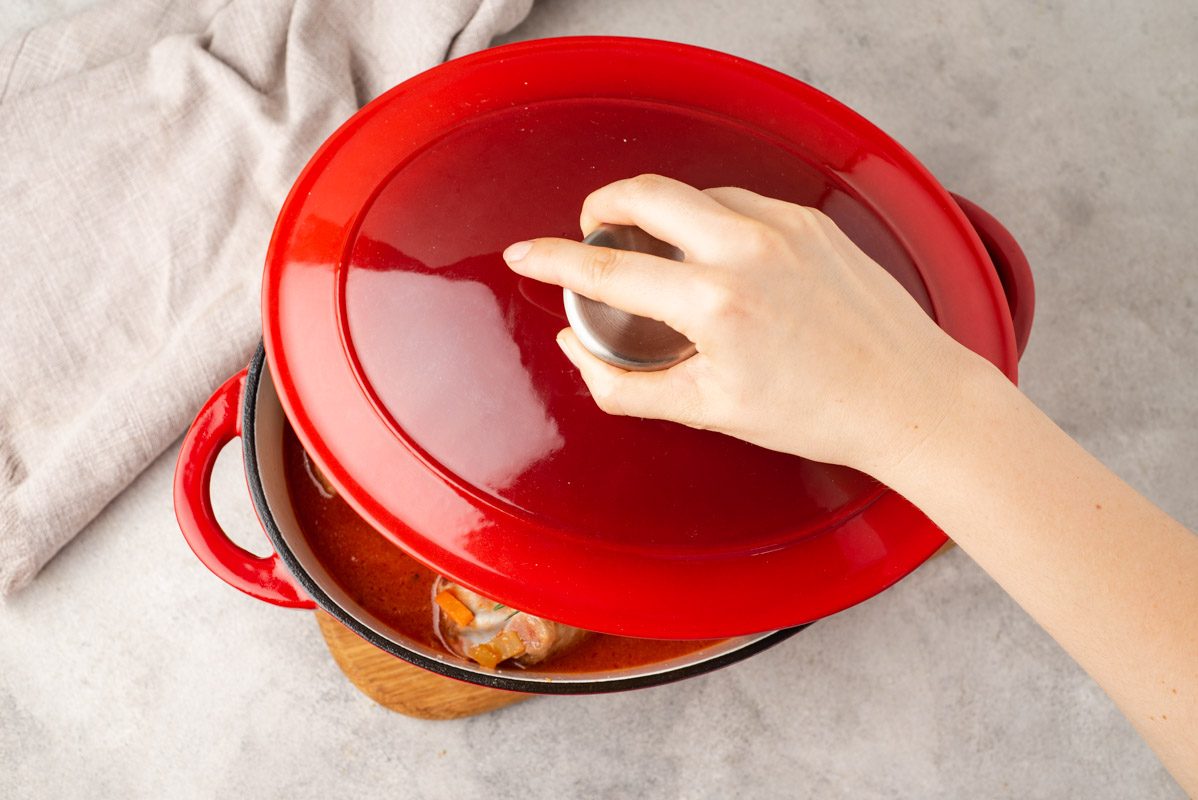;Resize,width=712;)
Place the lid on the Dutch oven and transfer it to the oven.
Place the lid on the Dutch oven and transfer it to the oven.
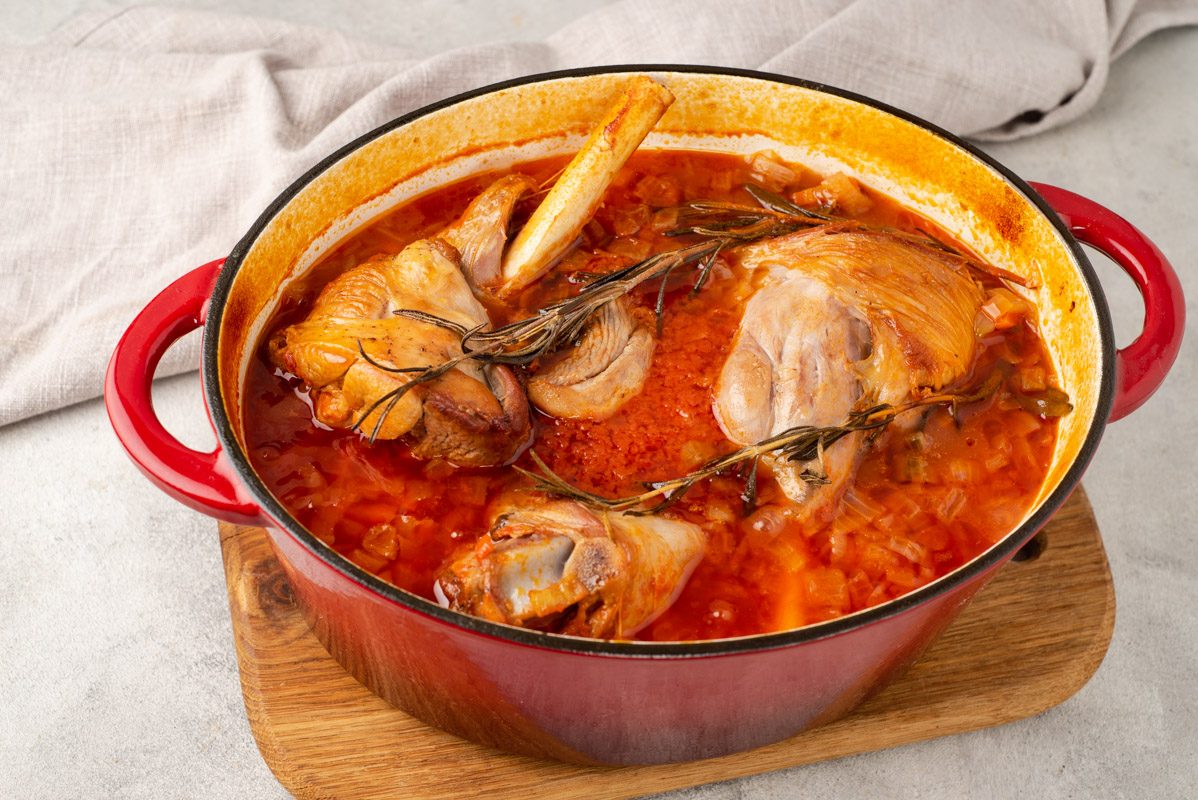;Resize,width=712;)
Bake for 2 hours, or until the lamb is tender.
Bake for 2 hours, or until the lamb is tender.
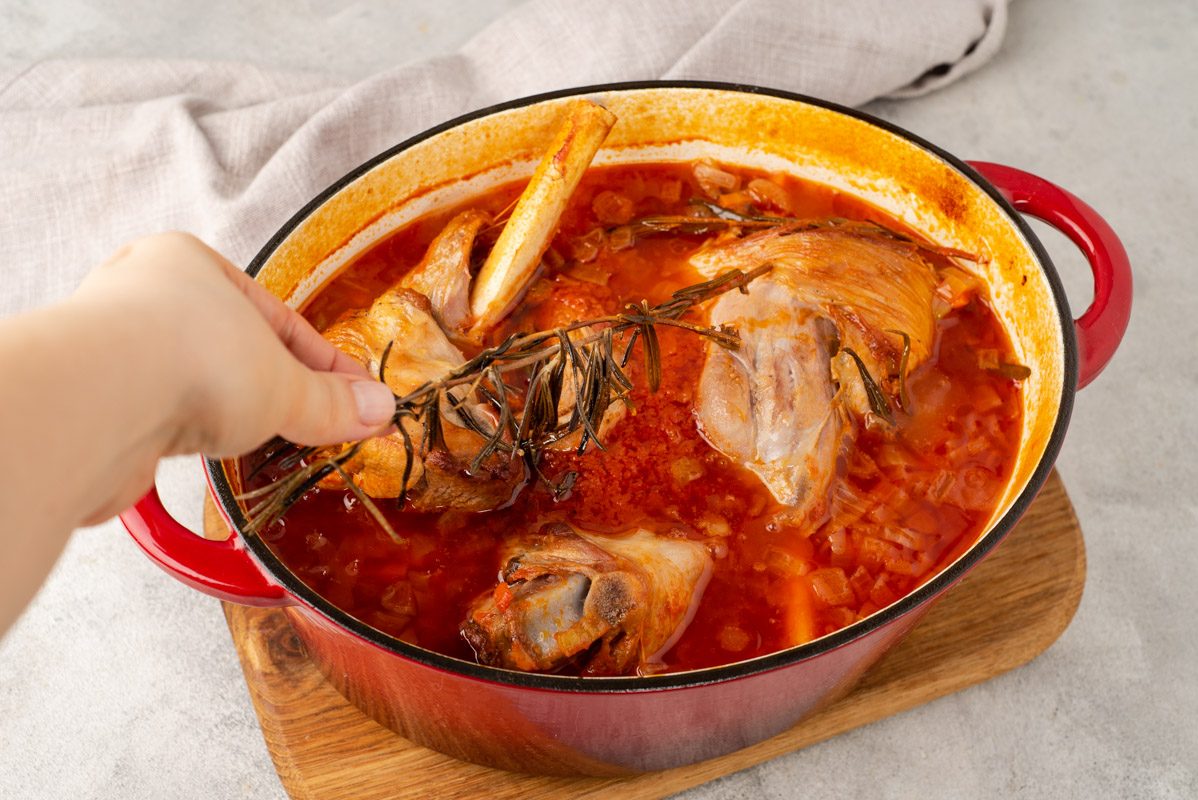;Resize,width=712;)
Take the lamb out of the Dutch oven and put it on a cutting board. Loosely tent it with foil. Remove the rosemary and discard.
Take the lamb out of the Dutch oven and put it on a cutting board. Loosely tent it with foil. Remove the rosemary and discard.
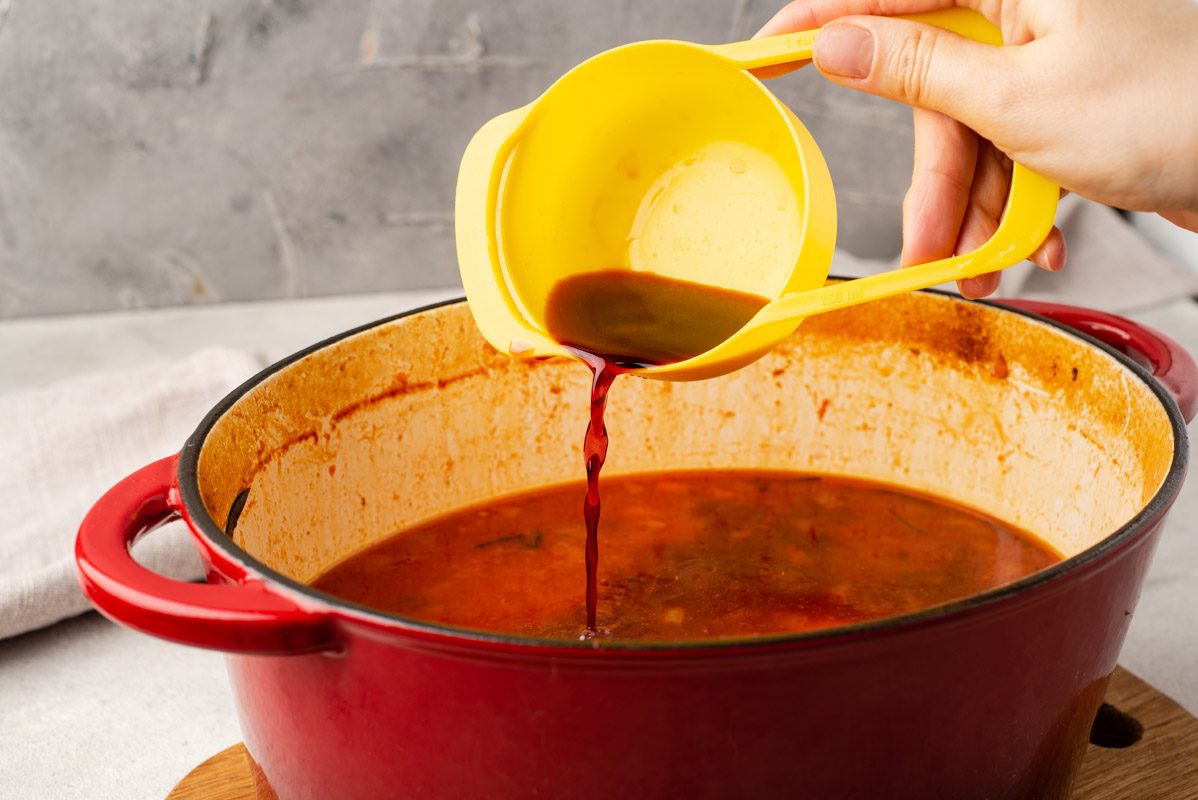;Resize,width=712;)
Place the Dutch oven on the stove over medium flame. Pour in the wine and bring the mixture to a boil. Lower the heat to a simmer and cook until for 10 minutes, or until the gravy thickens. Add in 2 tablespoons of butter. Stir to combine.
Place the Dutch oven on the stove over medium flame. Pour in the wine and bring the mixture to a boil. Lower the heat to a simmer and cook until for 10 minutes, or until the gravy thickens. Add in 2 tablespoons of butter. Stir to combine.
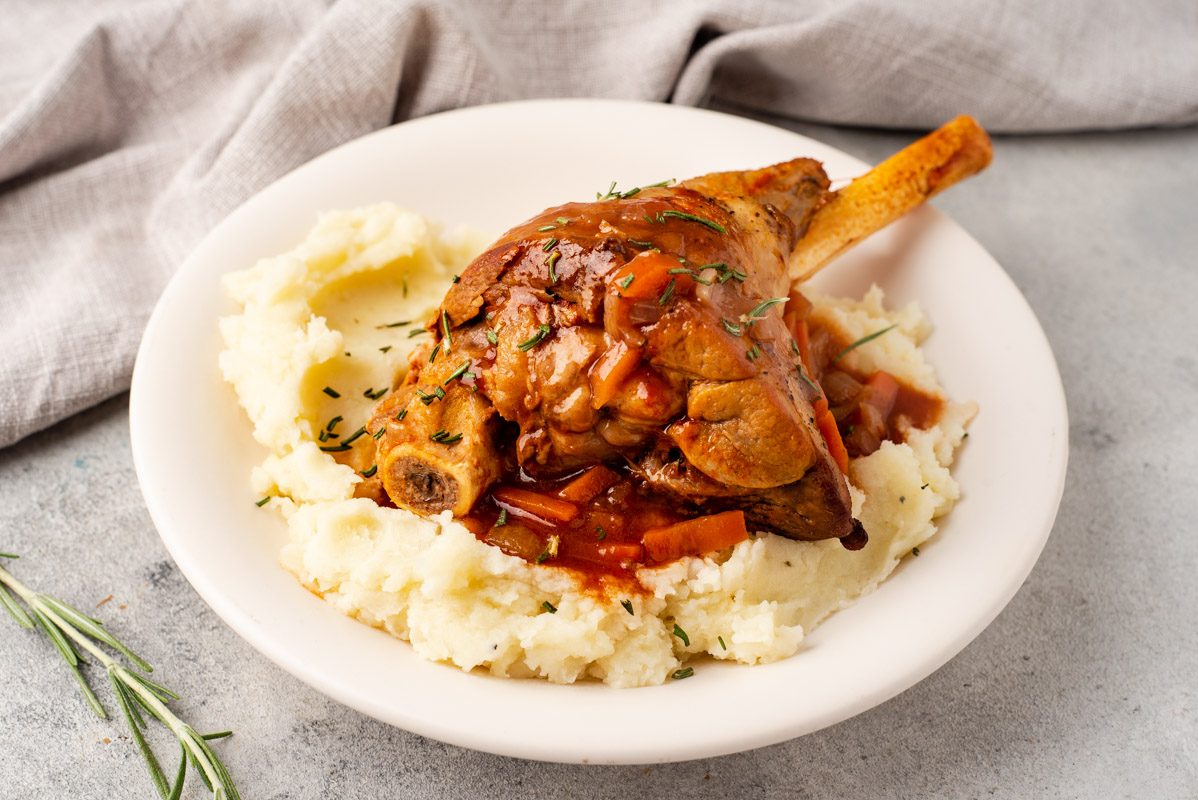;Resize,width=712;)
Serve the lamb over mashed potatoes and top with gravy.
Serve the lamb over mashed potatoes and top with gravy.
Notes
If you prefer not to use alcohol, you can use non-alcoholic wine, grape juice or pomegranate juice as a substitute.
;Resize,width=767;)
